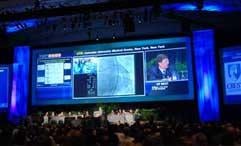
September 14, 2010 – Transcatheter valves, drug-eluting balloons and the latest stent comparison trial data are among the top three trends at Transcatheter Cardiovascular Therapeutics (TCT) 2010 scientific sessions Sept. 21-25 in Washington, D.C.
TCT provides significant clinical research updates on technologies and practices in interventional cardiology that will directly affect patient care.
“We are exceptionally excited about TCT this year – it may be the most provocative meeting we have had,” said Gregg W. Stone, M.D., director of cardiovascular research and education at the Center for Interventional Vascular Therapy at New York-Presbyterian Hospital/Columbia University Medical Center, and co-director of the medical research and education division at the Cardiovascular Research Foundation (CRF). TCT is organized by CRF.
Stone today previewed what he predicts are the top trends and most important research being presented at this year’s scientific sessions. He helped review more than 100 submissions that were considered for TCT’s “Late-Breaking Trials.” Stone said it was very difficult to pick the most important ones.
Transcatheter Heart Valves
The biggest trend that will be evident at TCT 2010 is transcatheter valves. “We are calling this year’s TCT the initiation of the era of valve interventions,” Stone said.
While a large number of sessions will cover transcatheter valves and the future direction of cath lab-based structural heart repair, Stone said the most important presentations will be on the one-year results from the PARTNER trial. This is the U.S. Food and Drug Administration (FDA) pivotal trial for the Edwards Sapien transcatheter aortic valve. If the results are good, the Sapien will be well on its way to FDA clearance. If the results are mixed or poor, it will make it more difficult for transcatheter valves to gain acceptance.
The FDA cleared the first transcatheter valve in the United States, the Medtronic Melody pulmonary valve, in early 2010. The approval was a positive step for U.S. transcatheter valve technology, but approval of the Sapien would have a greater impact, since the aortic valve makes up a much greater number of surgical valve replacements.
Stone said another transcatheter valve trial to watch for at TCT will be data from EVEREST II, which examines the use of the Abbott MitraClip mitral valve repair system for patients who are not healthy enough to undergo surgery.
Numerous live and taped cases at TCT will include transcatheter valve replacements, Stone said.
Interest in transcatheter patent foramen ovale (PFO) occlusion also increased this year, so a full-day PFO summit is planned for Monday, Sept. 20.
New Stent Technology
The Zilver PTX trial is among the most important stent studies being presented at TCT 2010, Stone said. He explained the trial is the first large-scale, randomized trial for a drug-eluting stent in the superficial femoral artery (SFA). It is the pivotal FDA trial for clearance of Cook Medical’s Zilver peripheral stent.
Data from several trials comparing various stents will also be among the hot topics at TCT. Stone said stents using bioresorbable, drug-eluting polymers and totally bioresorbable stents also continue to be among the top areas of interest.
At TCT 2009, one-year late-breaking results from the SPIRIT IV trial helped propel the Abbott Xience V everolimus-eluting stent into the No. 1 market position. Today, it makes up about 70-75 percent of all stents implanted worldwide, Stone said. He said two-year results from the trial are due at TCT this year and it will be interesting to see if the positive outcomes have continued over time.
Other stent comparisons Stone considers important are:
• SORT OUT IV, which compares everolimus-eluting Xience V and sirolimus-eluting Cypher stents
• ISAR TEST 5, a comparison of the ISAR rapamycin plus probucol-eluting stent versus the Endeavor Resolute zotarolimus-eluting stent
• ISAR-TEST 4, two-year clinical and angiographic outcomes comparing everolimus-eluting and sirolimus-eluting stents in patients with coronary artery disease
• HORIZON-AMI, which compares patients with ST-elevated myocardial infarction (STEMI) who are treated with either unfractionated heparin plus GP IIb/IIIa inhibitors or bivalirudin plus bail-out GP IIb/IIIa Inhibition and angioplasty with stent implantation. The stents used are either slow rate-release paclitaxel-eluting Taxus or bare metal Express2 stents
• CRISTAL, a comparison of sirolimus-eluting Cypher Select stents to balloon angioplasty for restenosis of drug-eluting coronary stents
Drug-Eluting Balloons
There have been several drug-eluting balloons (DEBs) released in Europe in recent years, and the first request for an investigational device exemption trial in the United States was filed with the FDA by Medrad in early 2010. The devices are expected to offer a new treatment option for both in-stent restenosis and peripheral lesions in the leg where stents do not fare well.
“Drug-eluting balloons are getting a lot of attention this year,” Stone said.
Among several DEB sessions, Stone said three will focus on the Lutonix paclitaxel-coated balloon for the prevention of femoropoliteal restenosis. One of them is the late-breaking LEVANT I trial.
Other Highlights
Stone said two other areas of interest at TCT 2010 include a focus on pharmacology, especially on new antiplatelet agents, and percutaneous venous interventions for deep vein thrombosis (DVT). The late-breaking TORPEDO trial examines endovenous intervention compared to anticoagulation alone in DVT patients.
Videos of live cath lab interventions have always been a highlight of TCT and this year Stone said there will be about 100 live cases.
For more information: www.tctconference.com
For a complete program, including sessions: www.tctconference.com/program/program-agenda.html


 November 14, 2025
November 14, 2025 









